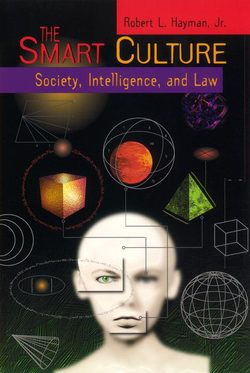Читать книгу The Smart Culture - Robert L. Hayman Jr. - Страница 9
На сайте Литреса книга снята с продажи.
Acknowledgments
ОглавлениеI am indebted to many people who, in various ways, made this book possible.
This is, first of all, very much an interdisciplinary effort, and some of the disciplines are not my own. For the science in particular, I have depended on the work of those scholars who have made contemporary understandings accessible to the general public. Ned Block, Stephen Jay Gould, Leon Kamin, and R. C. Lewontin are the most conspicuous examples, but as the notes will indicate, there are others too. Burton Blatt’s work exposed the myths of mental retardation, and my own earlier inquiries into that topic benefitted especially from the works (and kind encouragement) of Paul Lombardo and Alexander Tymchuk and the counsel of Fred Rich. My more recent efforts to sift through the primary literature were assisted by a number of doctoral students in psychology at Widener University: at various times, I have benefitted from the research assistance of Ann Christie, Leonard Goldschmidt, and David Nickelsen. Professor Susan Goldberg of Widener University and Professor Martin Levit at the University of Missouri-Kansas City reviewed drafts of selected chapters in an effort to make sure that the science was not obviously wrong; they deserve, of course, no blame for any lingering errors.
For the history too I have benefitted from the efforts of others. The works of Ira Berlin, Carl Degler, Eric Foner, John Hope Franklin, Leon Litwack, James McPherson, Edmund Morgan, and Winton Solberg figure prominently in the text, though again, as the notes reveal, there are many others. Peter Parish’s historiography of slavery, Alden Vaughn’s historiography of the roots of racism, and Eric Foner’s historiographical essay on Reconstruction were particularly valuable to this novice effort. On a more personal note, I must thank William Garfield for teaching me how to learn and appreciate history; I am grateful as well to the History Department at Davidson College for requiring all history majors to take a course in historiography (I am grateful too that they allowed me to graduate, despite an abysmally low History GRE score).
I was more at home with the legal analysis, but here too I must acknowledge certain debts. A. Leon Higginbotham and Thomas Morris have produced wonderful surveys of the law of slavery, and a loose coalition of contemporary legal scholars—the Critical Race Theorists—has generated invaluable critiques of the American law of “race.” The works of Derrick Bell, Richard Delgado, Charles Lawrence, and Patricia Williams figure prominently in the text; so too does the work of Martha Minow, on the construction of the many forms of “difference.” Alfred Avins’s partial collection of the debates over the Reconstruction Amendments provided a useful starting point for research, though I am certain that he would not approve of the way this text builds on his effort. Charles DiMaria, Hamel Vyas, Pamela Krauss, and Aaron Goldstein provided terrific research assistance; the last deserves special thanks for his help in sifting through the microfiche records of the congressional Reconstruction debates. Thanks too to Barbara Carcanague and Noreen McGlinchey of Widener University, and Despina Gimbel and Elyse Strongin at New York University Press, who provided outstanding administrative and technical support to the project. The Widener University School of Law provided a research stipend to fund part of this effort; special thanks to Dean Arthur N. Frakt for his generosity and support.
My more personal debts run the gamut, I suppose, from the ridiculous to the sublime. Close to the former, I feel obliged to acknowledge the constant companionship of Louis Armstrong, Ella Fitzgerald, Louis Jordan, and Bruce Springsteen, who were not, in truth, actually with me, but whose music was a steady inspiration as I pored through the notes and typed up the words. I would also like to thank the folks who populate the personal stories in this text. Some of them would recognize the events but not their names: I changed the names whenever I thought privacy was at issue and accuracy was not. The events, I think, mostly happened as I described them, though I have already discovered that recollections differ on some of the details. But the stories, in any event, are offered as “stories,” and their truths are decidedly personal.
Very much at the sublime end of the spectrum, I would like to thank the following family members, not only for giving me most of the stories, but also for their assistance, their support, their tolerance, and their affection: Patricia Eakin, Albert Griffiths, Alma Griffiths, Cynthia Hayman, Tom Hayman, Stephen Heim, Faye Kaufman, Galen Kaufman, Bob Maxwell, Harriet Maxwell, June Pesikey, William Sheridan, Katherine Thomas, Morris Thomas, Ron Whitehorne, and especially my mother, Norine Sheridan. The book is dedicated to them—but really, it is their book anyhow.
Special thanks as well to Niko Pfund at New York University Press for his remarkable patience, steady encouragement, and valuable insights. The same to Richard Delgado and Jean Stefancic, who helped inspire this effort and keep it on track; it would not have happened without them. And the most special of these special thanks to my frequent coauthor and always friend Nancy Levit; I suspected that it might be a real strain to write something without her, and am glad that I didn’t have to find out.
Finally, thanks to Alice Eakin, my editor, best friend, and wife. She provided the words when I needed them, and the ideas, and the muse—-and a whole world of kindness.
